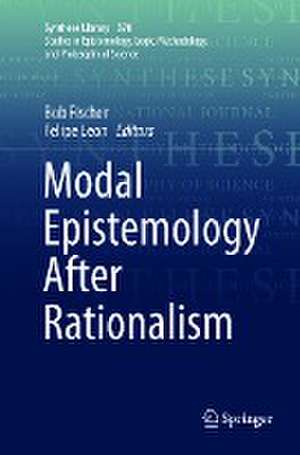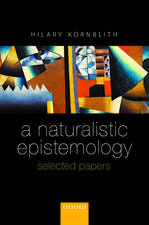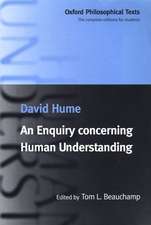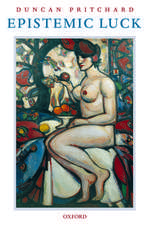Modal Epistemology After Rationalism: Synthese Library, cartea 378
Editat de Bob Fischer, Felipe Leonen Limba Engleză Paperback – 28 iun 2018
| Toate formatele și edițiile | Preț | Express |
|---|---|---|
| Paperback (1) | 697.82 lei 6-8 săpt. | |
| Springer International Publishing – 28 iun 2018 | 697.82 lei 6-8 săpt. | |
| Hardback (1) | 704.04 lei 6-8 săpt. | |
| Springer International Publishing – 16 noi 2016 | 704.04 lei 6-8 săpt. |
Din seria Synthese Library
- 15%
 Preț: 638.43 lei
Preț: 638.43 lei - 18%
 Preț: 989.98 lei
Preț: 989.98 lei - 15%
 Preț: 596.69 lei
Preț: 596.69 lei - 18%
 Preț: 903.93 lei
Preț: 903.93 lei - 15%
 Preț: 586.88 lei
Preț: 586.88 lei - 15%
 Preț: 696.50 lei
Preț: 696.50 lei - 18%
 Preț: 892.90 lei
Preț: 892.90 lei - 15%
 Preț: 643.34 lei
Preț: 643.34 lei -
 Preț: 282.33 lei
Preț: 282.33 lei - 5%
 Preț: 372.19 lei
Preț: 372.19 lei -
 Preț: 443.10 lei
Preț: 443.10 lei - 15%
 Preț: 637.59 lei
Preț: 637.59 lei - 18%
 Preț: 958.88 lei
Preț: 958.88 lei - 15%
 Preț: 642.36 lei
Preț: 642.36 lei - 18%
 Preț: 1230.66 lei
Preț: 1230.66 lei - 15%
 Preț: 642.83 lei
Preț: 642.83 lei - 18%
 Preț: 1000.39 lei
Preț: 1000.39 lei -
 Preț: 389.70 lei
Preț: 389.70 lei - 15%
 Preț: 637.28 lei
Preț: 637.28 lei - 18%
 Preț: 952.26 lei
Preț: 952.26 lei - 18%
 Preț: 1231.32 lei
Preț: 1231.32 lei - 15%
 Preț: 645.96 lei
Preț: 645.96 lei -
 Preț: 395.85 lei
Preț: 395.85 lei -
 Preț: 400.47 lei
Preț: 400.47 lei - 18%
 Preț: 1225.48 lei
Preț: 1225.48 lei - 15%
 Preț: 638.89 lei
Preț: 638.89 lei - 18%
 Preț: 1232.09 lei
Preț: 1232.09 lei -
 Preț: 380.45 lei
Preț: 380.45 lei -
 Preț: 394.87 lei
Preț: 394.87 lei - 15%
 Preț: 640.37 lei
Preț: 640.37 lei - 15%
 Preț: 639.08 lei
Preț: 639.08 lei -
 Preț: 381.98 lei
Preț: 381.98 lei - 15%
 Preț: 643.00 lei
Preț: 643.00 lei - 15%
 Preț: 672.29 lei
Preț: 672.29 lei
Preț: 697.82 lei
Preț vechi: 820.96 lei
-15% Nou
Puncte Express: 1047
Preț estimativ în valută:
133.52€ • 139.41$ • 110.51£
133.52€ • 139.41$ • 110.51£
Carte tipărită la comandă
Livrare economică 04-18 aprilie
Preluare comenzi: 021 569.72.76
Specificații
ISBN-13: 9783319830360
ISBN-10: 3319830368
Ilustrații: VI, 308 p. 4 illus.
Dimensiuni: 155 x 235 mm
Greutate: 0.45 kg
Ediția:Softcover reprint of the original 1st ed. 2017
Editura: Springer International Publishing
Colecția Springer
Seria Synthese Library
Locul publicării:Cham, Switzerland
ISBN-10: 3319830368
Ilustrații: VI, 308 p. 4 illus.
Dimensiuni: 155 x 235 mm
Greutate: 0.45 kg
Ediția:Softcover reprint of the original 1st ed. 2017
Editura: Springer International Publishing
Colecția Springer
Seria Synthese Library
Locul publicării:Cham, Switzerland
Cuprins
1. Introduction to Modal Epistemology After Rationalism (Bob Fischer).- 2. Naturalised Modal Epistemology (Daniel Nolan).- 3. Empirically-Informed Modal Rationalism (Tuomas E. Tahko).- 4. Modal Epistemology Without Detours (Scott A. Shalkowski).- 5. The Epistemology of Modality and the Epistemology of Mathematics (Otávio Bueno).- 6. Modal Knowledge: Beyond Rationalism and Empiricism (Anand Jayprakash Vaidya).- 7. Extending Modal Vision (Rasmussen).- 8. Personal Identity Without Too Much Science Fiction (Peter Kung).- 9. Modal Conventionalism and Textbook Analyticities (Biggs).- 10. Modal Knowledge, Evolution, and Counterfactuals (Thomas Kroedel).- 11. Imagination, Possibility, and Plovers (Hanrahan).- 12. Similarity and Possibility: An Epistemology of De Re Possibility for Concrete Entities (Roca-Royes).- 13. From Modal Skepticism to Modal Empiricism (Felipe Leon).- 14. Modal Empiricism: Objection, Reply, Proposal (Bob Fischer).- 15. Can Modal Skepticism Defeat Humean Skepticism? (Peter Hawke).
Notă biografică
Bob Fischer is an assistant professor of philosophy at Texas State University. He earned his Ph.D. from the University of Illinois at Chicago and works on problems in modal epistemology and applied ethics. He is co-editor of The Moral Complexities of Eating Meat (Oxford University Press, 2015), editor of College Ethics (Oxford University Press, 2016), and author of Modal Justification via Theories (Springer, forthcoming).
Felipe Leon is Assistant Professor of Philosophy at El Camino College. He earned his Ph.D. from the University of California, Riverside. He works primarily on issues in metaphysics, epistemology, and philosophy of religion. His current research focuses on the nature and scope of modal knowledge and its implications for philosophy of religion. His publications include “Why Frankfurt-Examples Don’t Need to Succeed to Succeed” (with Neal Tognazzini. Philosophy & Phenomenological Research 80:3, 20, “Moreland on the Impossibility of Traversing the Infinite: A Critique” (Philo 14:1, 2012), 10), and The Modal-Knowno Problem” (with Robert William Fischer. Southwest Philosophy Review, forthcoming).
Felipe Leon is Assistant Professor of Philosophy at El Camino College. He earned his Ph.D. from the University of California, Riverside. He works primarily on issues in metaphysics, epistemology, and philosophy of religion. His current research focuses on the nature and scope of modal knowledge and its implications for philosophy of religion. His publications include “Why Frankfurt-Examples Don’t Need to Succeed to Succeed” (with Neal Tognazzini. Philosophy & Phenomenological Research 80:3, 20, “Moreland on the Impossibility of Traversing the Infinite: A Critique” (Philo 14:1, 2012), 10), and The Modal-Knowno Problem” (with Robert William Fischer. Southwest Philosophy Review, forthcoming).
Textul de pe ultima copertă
This collection highlights the new trend away from rationalism and toward empiricism in the epistemology of modality. Accordingly, the book represents a wide range of positions on the empirical sources of modal knowledge. Readers will find an introduction that surveys the field and provides a brief overview of the work, which progresses from empirically-sensitive rationalist accounts to fully empiricist accounts of modal knowledge. Early chapters focus on challenges to rationalist theories, essence-based approaches to modal knowledge, and the prospects for naturalizing modal epistemology. The middle chapters present positive accounts that reject rationalism, but which stop short of advocating exclusive appeal to empirical sources of modal knowledge. The final chapters mark a transition toward exclusive reliance on empirical sources of modal knowledge. They explore ways of making similarity-based, analogical, inductive, and abductive arguments for modal claims based on empirical information. Modal epistemology is coming into its own as a field, and this book has the potential to anchor a new research agenda.
Caracteristici
Represents a broad range of positions on the sources of modal knowledge, highlighting the new trend toward empiricism in modal epistemology Features essays that explore candidate empirical sources and marks the trend toward away from modal rationalism and toward modal empiricism Shows that the basic element in empirical sources of modal knowledge is an inference from the actual to the possible













